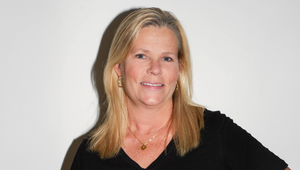
How YouTube Is Enabling a More Diverse Creative Talent Pool in the UK

Open platforms like YouTube, Tiktok and Instagram are nurturing a more diverse and representative talent pool of creative voices than traditional broadcasters and even streaming services, according to a pair of new reports from Google UK’s Insights team.
A study from Oxford Economics shows that YouTube’s creator ecosystem alone supports the equivalent of 40,000 jobs and contributes £1.4bn to the UK’s GDP. Meanwhile, the ‘Mirrors and Windows’ report, which explores how identity intersects with media habits in the UK, also demonstrates that the platform is perceived to be inclusive, with 79% of users believing that YouTube represents a wide range of voices, people and perspectives.
Nishma Patel Robb is senior marketing director at Google UK, and while she’s a long-term Googler with a deep appreciation of the platform, she was surprised to see the scale of the impact YouTube’s creators have on the British economy. “I have to say, I think the contribution and the number of 40,000 people being ‘employed’ in some respects is what's enabled by the ecosystem. Bearing in mind, that's double what the BBC employs,” she says. “That blew my mind, if I'm honest. I think that the scale of the contribution was far greater than I'd anticipated.”
The diversity of and wealth generated by the creator economy shows what happens when barriers to entry are lowered - a cohort of diverse creative entrepreneurs emerges, broadening the UK’s talent pool.
And as much as that has the potential to feed into and transform the wider creative industries, it, crucially, also has the power to make a real difference for individuals and communities. “For me, there's a real conscious aspect to this - the money people are spending on advertising on the YouTube platform then supports this wonderful ecosystem of creators. [They] are getting funded to not just make great content, but improve their lives,” says Nishma, who shares that creators have said that their creative careers on YouTube have enabled them to send their children to university.
The survey of 10,000, carried out by MTM and Google UK’s Insights team digs into people’s perception of how well the media landscape is doing when it comes to representation generally - and it’s a mixed, though largely positive, picture. Overall, the UK’s media platforms are doing a reasonable job of representing a wide range of voices, people and perspectives and sharing both local and international content, with 72% saying they felt the media put out content that is relevant and relatable across all platforms and channels.
The survey also found that eight out of ten people were concerned about inequality and disrimination on the basis of protected characteristics - and those concerns were shared across all audiences, though notably higher with some than others. For example, less than a third of people with disabilities and older people surveyed felt they were well represented in UK media.
Digging into the research, the survey looked at the ten biggest media brands in the UK, from open platforms like YouTube, social media sites, streaming services and, of course, traditional broadcasters. The research found that open platforms support the creation and distribution of content that is more representative and inclusive. Authenticity is a significant part of this, both for viewers and marketers looking to connect with audiences. YouTube scored the highest on authenticity (74%) - but notably, linear TV (64-68%) edged out all social media (55%-66%) with the exception of TikTok (73%).
“As a marketeer, I'm obsessive about making sure our creative is responsible, reflective and represents the UK - and not just as a visual representation but in an authentic portrayal. We've worked hard through our storytelling. I know through other marketeers and the company I keep that we're all obsessed with that. People know the most effective advertising is that which has the most authentic portrayal and connects to an audience. And as much as I’ve seen such brilliant progress on that creative front, if I look at it from a media point of view, it’s still challenging to really ensure that your work and your stories are reaching every part of the UK. And that’s what this research is talking about - the fact that YouTube is a critical part of the media.”
The report also revealed people’s multidimensional sense of identity. While protected characteristics like race, sex, disability, age, sexuality, religion or gender reassignment are important, people are just as driven by their passions and interests. According to the survey, YouTube outperforms all other platforms when it comes to allowing people to really dig into their passions, with 76% of respondents agreeing. Nishma reveals that she is currently learning to DJ and uses YouTube to help her on her journey.
“We now have 1,000 creators with over a million subscribers each. I think that’s nuts when you think about a million subscribers. I know a lot of friends who work in production who make amazing content who would kill for a million subscribers. I think it’s interesting that what was seen as fragmented niches is actually now amassing to that market volume, which we need to get our heads around from an advertising or business perspective. Because they’re not niches any more - these are considerable media properties.”
Beyond those specific, idiosyncratic passion points, one striking element that comes through in the Mirrors and Windows report is a marked universality that unites all of the very different people surveyed, each with their own unique identity: When it comes to self-description, most people talk about family, music and being a caring person. In a world that can feel like it’s becoming more polarised and tribal, with people being squeezed into simple boxes and pulled apart across arbitrary battle lines, it presents a more nuanced view - rich and varied, but universally humane. Another universality that the report teases out is a shared sense of anxiety - across creators, viewers, brands and media professionals - as with so much complexity to navigate when it comes to identity, everyone wants to make sure that they get it right.
“I love the term ‘Mirrors and Windows’,” says Nishma. “This idea that YouTube is a ‘mirror’ that reflects the UK, so I see myself reflected there in all my random and bizarre sets of interests, and everyone can see themselves reflected in some way or another. And then this idea of ‘windows’ - the idea that you can have a peek into someone else's world and really foster that curiosity. In a quite polarised world, I think that becomes more important.”
Ultimately, with fewer barriers and greater democratisation those mirrors onto ourselves and windows onto the world should get even brighter and clearer as a more diverse and representative creative talent pool emerges.
“I’m a big believer in the importance of creativity, in education and in our lives in every sense,” says Nishma. “It’s why I love the work we do through Google Arts and Culture, it’s why I love what we do on YouTube, which I think is critical to a happy society. There are only so many pages in a book, so many pages in a magazine and I think there’s an infinity to YouTube. It’s beautiful.”















